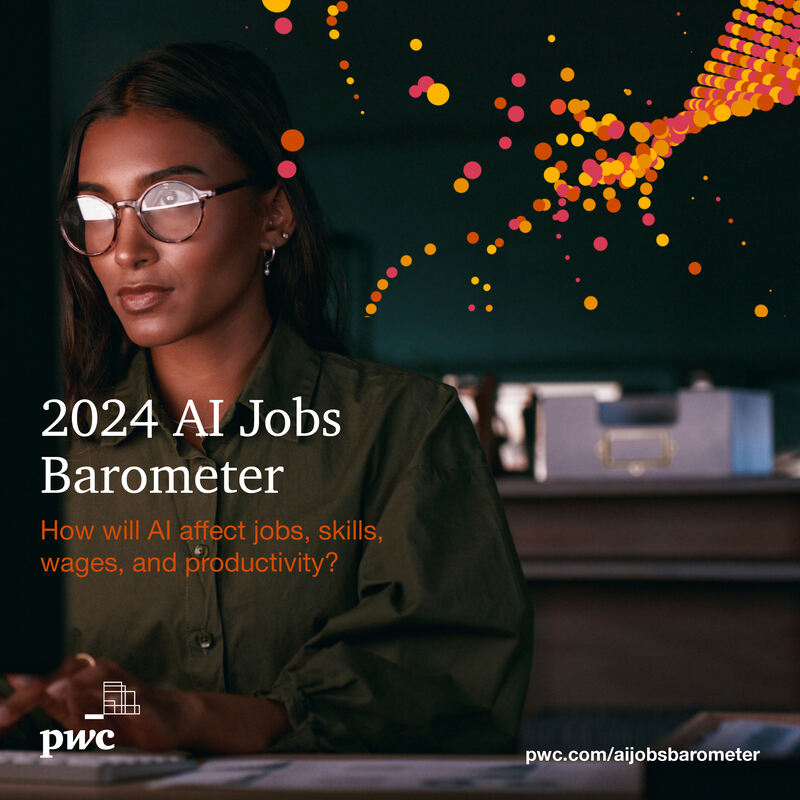PwC Report: AI Sectors Achieve 5x Productivity
Sectors more exposed to AI are experiencing almost five times [4.8x] higher growth in labour productivity, according to PwC’s inaugural 2024 Global AI Jobs Barometer.
A spokesperson said, “The report, which analysed over half a billion job ads from 15 countries, suggests that AI could allow many nations to break out of persistent low productivity growth, generating economic development, higher wages, and enhanced living standards.
“The report finds that for every job posting requiring AI specialist skills [like machine learning] in 2012, there are now seven job postings. PwC research also finds that growth in jobs demanding AI skills has outpaced all jobs since 2016, with postings for jobs requiring AI skills growing 3.5x faster than for all jobs.
“The findings also highlight economic opportunity for labour forces: jobs that require AI skills carry up to a 25% average wage premium in some markets.
“Skills sought by employers are changing much faster in occupations more exposed to AI, with old skills disappearing – and new skills appearing – in job ads at a 25% higher rate than in occupations less exposed to AI. To stay relevant in these occupations, workers will need to demonstrate or acquire new skills.
“As questions abound around the technology’s impact on everything from job security to long-term business viability, the findings highlight positive news, even for workers in sectors most exposed to AI. The findings also reflect a good news story for workers and the global economy in which AI-enabled workers are more productive and more valuable, opening the door to rising prosperity for workers and nations. Like past technological revolutions from electricity to computers, AI is changing what it takes for workers to succeed – and those who adapt may enjoy vast new opportunities.”
Alistair McNeish, Director, People and Organisation, PwC Bermuda.
Arthur Wightman, Leader, PwC Bermuda, says, “AI is reshaping the global labour market, offering good news for economies grappling with significant challenges. It brings promising prospects for economic growth, job expansion, and the emergence of new industries. However, the shift necessitates upskilling for workers and strategic investments in AI by organizations to thrive in the AI era.”
Near fivefold productivity growth in sectors more exposed to AI
The spokesperson said, “The findings paint a positive picture of the impact of AI on labour markets and productivity. Sectors most exposed to AI – financial services, information technology, and professional services – are experiencing nearly 5x higher labour productivity growth than sectors less exposed to AI.
Jobs that require AI skills carry significant wage premiums
“Across the five major labour markets for which wage data is available [US, UK, Canada, Australia and Singapore], jobs that require AI specialist skills carry a significant wage premium [up to 25% on average in the US], underlining the value of these skills to companies. Across industries [in the US for example], this can range from 18% for accountants, 33% for financial analysts, 43% for sales and marketing managers, to 49% for lawyers. While the wage premium differs by market, overwhelmingly this is higher in all markets analysed.
AI penetration is accelerating, particularly in knowledge work sectors
“The study finds that knowledge work sectors are seeing the most rapid growth in the share of roles requiring AI skills. This includes financial services [2.8x higher share of jobs requiring AI skills vs other sectors], professional services [3x higher], and information & communication [5x higher].”
Alistair McNeish, Director, People and Organisation, PwC Bermuda, says, “Businesses must prioritise investing in the skills needed for their workforce and organisations to succeed in an evolving global economy shaped by AI. It is critical to adopt a skills-first recruitment approach and continue upskilling efforts to navigate the profound impact of AI on all industries and markets. Embracing this transformation is key to staying competitive and thriving in the future job landscape.”
No going back to yesterday’s jobs markets: the skills building imperative
The spokesperson said, “Companies, workers, and policymakers share responsibility for helping workers build the skills to succeed in a fast changing jobs market. Skills demanded by employers in occupations more exposed to AI are changing at a 25% higher rate than in less exposed occupations. 69% of CEOs expect AI will require new skills from their workforce, rising to 87% of CEOs who have already deployed AI, according to PwC’s 27th Annual Global CEO Survey 2024.”
Read More About
Category: All, Business, technology



